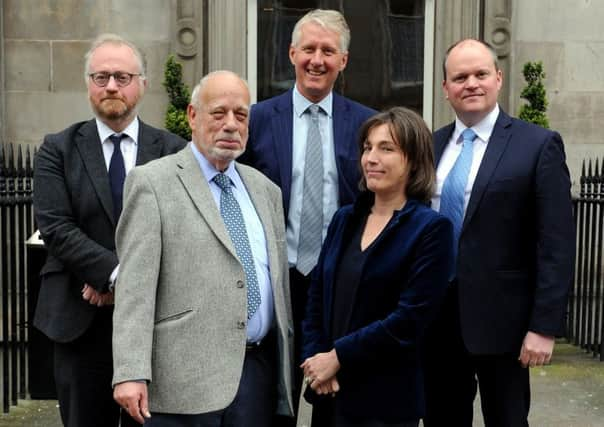Post-Brexit it is debt that holds key for investors


Russell Napier, an expert in financial markets, said: “We are living in an exceptional period of history with exceptional levels of debt, as high as at the end of World War Two – but the situation is worse than it was in the past because the private sector is also very heavily indebted.
“We need some idea of where debt is going if we are to invest successfully.”
Advertisement
Hide AdAdvertisement
Hide AdNapier said the US Government’s debt:GDP ratio was at 100 per cent, but this rose to 120 per cent when private sector debt was factored in.
“Without a shadow of doubt, the level of debt is higher than it has ever been in relation to our economy. The idea that we are getting gearing under control is absolute nonsense.”
Napier raised the spectre of capital controls and feared a referendum to increase the power of Turkey’s President Erdogan on 16 April could be a trigger-point for a “dangerously indebted” global financial system.
He said: “If Erdogan wins, he will become a dictator in Turkey and he has borrowed $400 billion.
“Not long after the vote, something will happen, potentially in the form of capital controls, which will mean Turkey will not be paying back its $400 billion of debt. That will be a shock to the world financial system.”
Napier said in this context, his advice to investors was: “Be very cautious. Take a multi-asset approach and don’t just go for equities.”
Chairman Bill Jamieson had introduced the event – Investing in a post-Brexit World – by noting that the feared impacts of Brexit had not yet materialised: “The Dow Jones is up 20 per cent since last June, the FTSE up 23 per cent. What could possibly go wrong?”
Merryn Somerset-Webb, editor-in-chief of Moneyweek, also raised the prospect of greater government controls over the economy.
Advertisement
Hide AdAdvertisement
Hide AdShe argued that the votes for Brexit and Trump were a sign that people wanted politicians to do more, not less.
Quoting fellow Financial Times columnist, Gillian Tett, she said: “To explain the results, follow the verb. Hillary Clinton’s slogan was ‘I’m with her’ – rubbish, no verb. Trump campaigned to ‘Make America great again’.
In the EU referendum, we had ‘Stronger in’ – again no verb– against ‘Take back control’. It’s all about the verb, where the action is.
“People are asking their governments to be sovereign – and this means a conscious reaction against globalisation, against the supra-national bodies like the European Union, the International Monetary Fund and the Word Trade Organisation which have seized all the power.
“Populism is not a rebellion against politicians – it’s pro-politician, a plea for them to be more like politicians and take action.”
It was also a rebellion, she argued, against the power of big business – and governments were heeding the message that they should intervene more to look after the people’s interests rather than big utilities and large corporates.
“Governments have nothing left in their coffers, so they need to find somewhere cash is available – and it is sitting on the balance sheets of the big corporates,” said Somerset-Webb.
“The more I see money sitting on the balance sheets of big companies like Apple, the more I expect governments to come for it.
Advertisement
Hide AdAdvertisement
Hide Ad“I also expect beneficial tax positions enjoyed by the likes of eBay and Facebook to end.
“Theresa May keeps telling big businesses they can no longer play by a different set of rules.”
Somerset-Webb said the implication for investors was to avoid companies whose profits could be affected by government interventions and price caps – including utilities and pharmaceuticals.
“This will have a big impact on corporate profits,” she added.
Her advice was: “There is lots of love for SMEs, but none for big corporates, so choose small over big, and go for the vibrant and vigorous.
“Look for value now rather than future growth as none of us know what will happen tomorrow.”
Somerset-Webb also warned delegates to “be ready for inflation”, while Tom Walker of Martin Currie said inflation was starting to feed through into the UK economy, with the 2.3 per cent level in February set to rise to 2.8 per cent by the end of 2017.
Napier gave a blunt warning on the same subject: “The US has not reduced its gearing since 2007 and debt levels are soaring in Europe and China to an all-time high debt-to-GDP ratio. The ultimate solution will be very high inflation.”
Advertisement
Hide AdAdvertisement
Hide AdHe forecast a general downturn in equity prices in the US, adding: “If you are prepared to hold for the long-term, it will make little difference. But when markets go down, we tend to sell.
“Can you cope with an episode like 2007-2009? We spent too much time looking at equity markets and not enough time looking at ourselves.”
Napier argued that Brexit was “an opening salvo in a much bigger business” and would prove “very small beer” if the Eurozone broke up. He continued: “Control is a word back in fashion – control of borders, of governments, of corporates. Now capital controls are a possibility.
“If populism is people trying to get control, how do they get it? Restricting the flow of private sector capital might be one way.”
Bob Hair of Cazenove Capital Management was more prosaic about the impact of Brexit.
He said: “I think financial planning post-Brexit will look very much like before. We will face a few bumps in the road but will still want to do things in a very ordered way.”
Hair stressed that taxation changes were also central to future financial planning, and described what he called the ‘tartan tax trap’ and voiced concerns that new taxation powers might mean Scots working in London classed themselves as UK taxpayers and reduced the intake to Scotland’s public funds. n